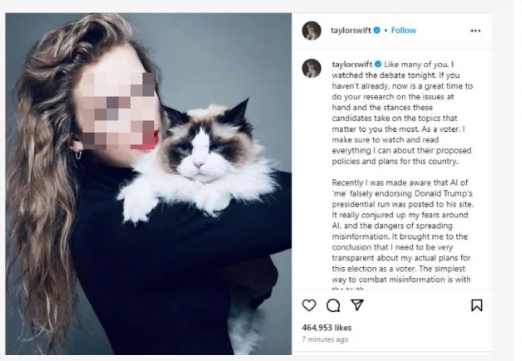Recently, pop singer Taylor Swift (Taylor Swift) publicly announced her support for U.S. Vice President Kamala Harris, a move that attracted widespread attention. Her decision stemmed from the discovery that someone was using AI technology to fabricate pro-Trump images and spread false information. Swift expressed concerns about the misuse of AI technology on social media and emphasized the importance of maintaining the authenticity of information. Her statement not only demonstrates her sense of responsibility as a public figure, but also reflects the new challenges brought by AI technology in the field of information dissemination.
Recently, pop singer Taylor Swift announced on social media that she will vote for Vice President Kamala Harris in the upcoming presidential election.
Swift's decision was prompted in part by seeing some AI-generated images of her that falsely showed her supporting Trump's presidential campaign.
She said on Instagram: "Recently I became aware of falsely pro-Trump AI images of 'me' being posted to his website. It made me fear AI and also made me think about the role of spreading disinformation. Danger."

Swift believes that as a voter, she needs to be transparent about her voting plans. Taylor ended the post with the signature "Childless Cat Lady" and a photo of herself holding a cat, mocking Trump deputy Vance's attack on "childless cat ladies."

It is worth mentioning that Musk also joined in the fun. After Swift posted, Musk subsequently posted a new tweet: "Okay Taylor... you win... I will give You a child and protect your cat with my life”. This is so hard to say!

It is worth noting that this is not the first time Swift has encountered problems with AI images. Earlier this year, some non-consensual AI-generated sexualized images circulated on social media, even drawing attention to the issue from the White House and calling for legislation to address it.
Against this backdrop, some AI companies have begun increasing restrictions on their tools to reduce election-related disinformation. For example, Google recently announced that it would limit election-related queries in its AI-generated search results feature. These efforts are obviously to address the various challenges posed by AI technology, especially in an era where information is disseminated increasingly rapidly.
Highlight:
Taylor Swift announces support for Vice President Kamala Harris against Trump's AI fake endorsement.
? She called for transparency and emphasized using truth to combat false information.
Concerns about the misuse of AI technology have prompted some companies to tighten controls on information.
Swift's public statement is not only an expression of her personal political stance, but also raises concerns about the misuse of AI technology and the spread of false information. The incident also prompted technology companies to strengthen supervision of AI technology to prevent its malicious use and maintain the healthy development of the network information environment. This incident adds a new dimension to the upcoming election and raises new issues in the ethics and regulation of AI technology.